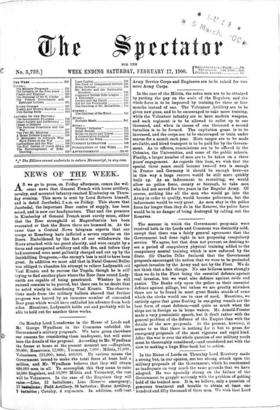The manner in which the Government proposals were received both
in the Lords and Commons was distinctly cold, except that there was a fairly general agreement that the Government had done right in not proposing compulsory service. We agree, but that does not prevent us desiring to see a period of compulsory physical training added to the compulsory mental training which is now enforced by the State. Sir Charles Dilke declared that the Government proposals encouraged the notion that we were to be protected against invasion by the Army and not by the Fleet. We do not think that a fair charge. No one believes more strongly than we do in the Fleet being the essential defence against real invasion, but we want also defence against raids and panics. The Banks rely upon the police as their essential defence against pillage, but unless we are greatly mistaken there are to be found in most great Banks stands of arms which the clerks would use in case of need. Meantime, we entirely agree that guns floating in sea-going vessels are the best form of coast defence,—and quite as much when the ships are in foreign as in home waters. Mr. Arnold-Forster made a very pessimistic speech, but it dealt rather with the general problem of the defence of the Empire than with the details of the new proposals. At the present, however, it seems to us that there is nothing for it but to press for emergency proposals of the most vigorous and rapid kind. After the war is over the whole question of our military needs must be thoroughly considered,—and considered not with the view to making a huge Blue-book but to action.






































